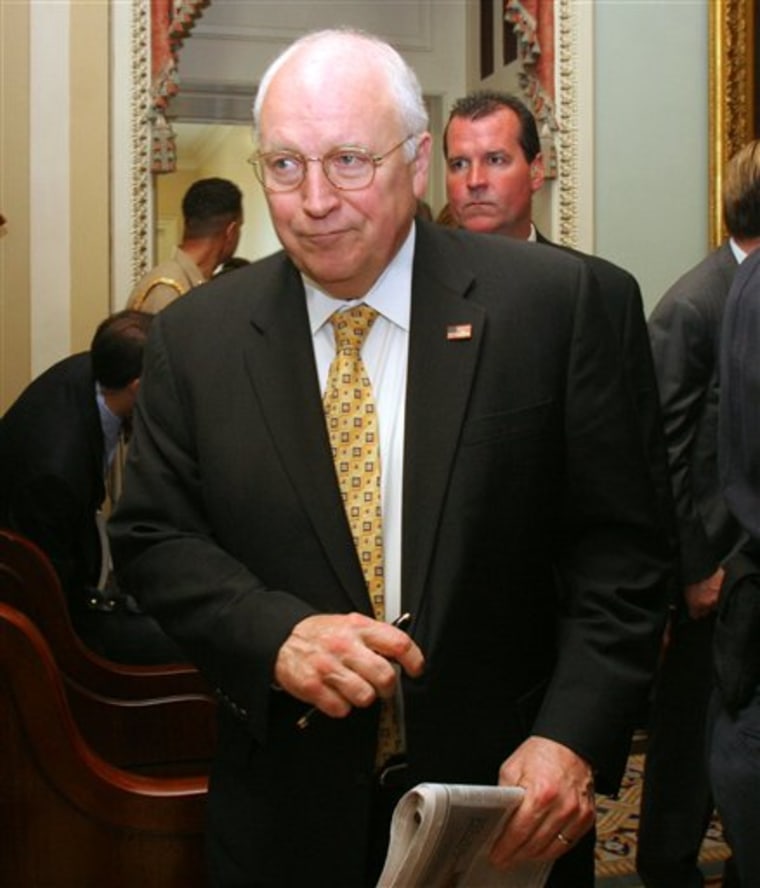Vice President Dick Cheney blocked the promotion of a Justice Department official involved in a bedside standoff over President Bush's eavesdropping program, a Senate committee learned Wednesday.
In a written account, former Deputy Attorney General James Comey said Cheney warned Attorney General Alberto Gonzales that he would oppose the promotion of a department official who once threatened to resign over the program.
Gonzales eventually decided against trying to promote Patrick Philbin to principal deputy solicitor general, Comey said.
"I understood that someone at the White House communicated to Attorney General Gonzales that the vice president would oppose the appointment if the attorney general pursued the matter," Comey wrote. "The attorney general chose not to pursue it."
Comey responded to written questions from the Senate Judiciary Committee chairman, Sen. Patrick Leahy, D-Vt.
Comey's account provides new detail in a sprawling, Democratic-elicited story of how much the White House influences the department's operations.
More hiring details unveiled
Also Wednesday, the department released 39 new pages of internal e-mails and documents that partly detail efforts by the department's former White House liaison, Monica Goodling, in January 2006 to obtain authority to hire and fire political staffers.
"Ok to send up directly to me, outside of system," Goodling wrote in a Jan. 19, 2006, e-mail to Paul Corts, the assistant attorney general for administration.
The Democrats' investigation into whether the firings of eight U.S. attorneys were improperly political led to testimony last month in which Comey disclosed details of a hospital visit on March 10, 2004, to the attorney general at that time, John Ashcroft.
Democrats contend the story shows the White House's heavy-handed influence over the department, including the agency's role to periodically endorse the National Security Agency's eavesdropping program.
Philbin was one of two Justice Department officials who led a review of the classified program and provided some of the research that led Comey to refuse to endorse it, Comey said.
"Mr. Comey has confirmed what we suspected for a while that White House hands guided Justice Department business," said Sen. Chuck Schumer, D-N.Y., who is leading the Senate's investigation. "The vice president's fingerprints are all over the effort to strong-arm Justice on the NSA program."
Cheney spokeswoman, Lea Anne McBride, declined to respond, citing the administration's policy of not commenting on personnel matters.
Review led to hospital bedside visit
According to Comey, he and Ashcroft had refused to recertify the legality of Bush's warrantless wiretapping program for reasons that are classified. When Ashcroft fell ill with pancreatitis, the powers of his office transferred to Comey, Ashcroft's deputy.
During a meeting at the White House on March 9, 2004, Comey told Cheney he would not certify the program, he said in his written remarks Wednesday.
The next night, then-White House Counsel Gonzales and Bush's chief of staff, Andy Card, went to Ashcroft's bedside in intensive care unit at George Washington University Hospital. Tipped to the impending visit, Comey and his aides were present when Gonzales urged Ashcroft to recertify the program. Ashcroft, who just had gall bladder surgery, refused, Comey testified last month.
The White House recertified the program without the department's endorsement. That led Comey, Ashcroft, FBI Director Robert Mueller, Philbin and other department officials to prepare their resignations. Faced with a mass walkout at the top of his Justice Department, Bush relented and made changes in the eavesdropping program that Comey and Mueller said were necessary to win their approval.
According to Comey, Philbin later was considered for a promotion to be principal deputy solicitor general - lieutenant to the lawyer who represents the government before the Supreme Court.
"It was my understanding that the vice president's office blocked that appointment," Comey said in his written remarks.
